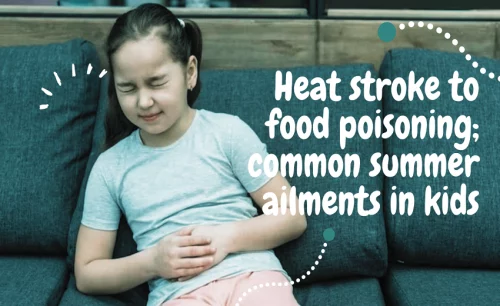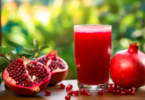Summer is a time for outdoor fun and exploration, but it can also bring a range of health challenges for children. As temperatures soar and kids spend more time outside, they become more susceptible to certain illnesses and conditions. In this article, we’ll explore some of the most common summer ailments in kids, from heat stroke to food poisoning.
- Heat Stroke
- Sunburn
- Dehydration
- Insect Bites
- Food Poisoning
Heat Stroke:
Heat stroke is a serious condition that can occur when the body overheats. Children are particularly susceptible to heat stroke, as their bodies heat up faster and cool down more slowly than adults. Here, we’ll explore the causes, symptoms, and treatments of heat stroke in kids.
Causes of Heat Stroke
Heat stroke can occur when the body is exposed to high temperatures for extended periods. In children, the most common causes of heat stroke include playing or exercising outside in hot weather, being left in a hot car, or not drinking enough fluids on a hot day.
Symptoms of Heat Stroke
The symptoms of heat stroke can range from mild to severe and can include a high body temperature, headache, nausea, dizziness, confusion, and even seizures. It’s important to recognize the symptoms of heat stroke early on, as prompt treatment can prevent serious complications.
Treatment of Heat Stroke
If a child is experiencing symptoms of heat stroke, it’s important to take immediate action to cool their body down. This can include moving them to a cooler environment, removing excess clothing, and giving them fluids to drink. In severe cases, medical attention may be necessary to prevent further complications.
Prevention of Heat Stroke
The best way to prevent heat stroke in kids is to take proactive measures to keep them cool and hydrated during hot weather. This can include encouraging them to drink plenty of fluids, scheduling outdoor activities during cooler times of the day, and providing shade and air conditioning when possible.
Sunburn:
Sunburn is common summer ailments in kids, from heat stroke to food poisoning, occurring when their skin is exposed to too much sunlight without adequate protection. Although sunburn is usually mild and easily treated, it can be painful and can increase the risk of skin cancer later in life. Here, we’ll explore the causes, symptoms, and treatments of sunburn in kids.
Causes of Sunburn
Sunburn occurs when the skin is exposed to UV radiation from the sun. Children are particularly susceptible to sunburn, as their skin is thinner and more sensitive than adults. Sunburn can occur after just 15 minutes of sun exposure, and can be exacerbated by factors such as high altitude, reflective surfaces, and certain medications.
Symptoms of Sunburn
The symptoms of sunburn can range from mild to severe and can include redness, pain, blisters, and even fever and chills. It’s important to recognize the symptoms of sunburn early on, as prompt treatment can prevent further damage to the skin.
Treatment of Sunburn
If a child is experiencing symptoms of sunburn, several steps can be taken to ease their discomfort and promote healing. This can include applying cool compresses to the affected area, using over-the-counter pain relievers, and keeping the skin moisturized. In severe cases, medical attention may be necessary to prevent further complications.
Prevention of Sunburn
The best way to prevent sunburn in kids is to take proactive measures to protect their skin from UV radiation. This can include wearing protective clothing and hats, using sunscreen with an SPF of 30 or higher and avoiding sun exposure during peak hours (10 a.m. to 4 p.m.).
Dehydration:
Dehydration is a common summer ailments in kids, from heat stroke to food poisoning, occurring when their bodies lose more fluids than they take in. Although dehydration is usually mild and easily treated, it can be serious and even life-threatening if left untreated. Here, we’ll explore the causes, symptoms, and treatments of dehydration in kids.
Causes of Dehydration
Dehydration can occur when a child is not drinking enough fluids or when their body loses fluids through sweating, vomiting, or diarrhoea. Children are particularly susceptible to dehydration, as they have smaller bodies and higher water requirements than adults.
Symptoms of Dehydration
The symptoms of dehydration can range from mild to severe and can include thirst, dry mouth, fatigue, dizziness, and even fainting. It’s important to recognize the symptoms of dehydration early on, as prompt treatment can prevent serious complications.
Treatment of Dehydration
If a child is experiencing symptoms of dehydration, it’s important to take immediate action to replenish their fluids. This can include giving them water or an electrolyte solution and encouraging them to rest and stay cool. In severe cases, medical attention may be necessary to prevent further complications.
Prevention of Dehydration
The best way to prevent dehydration in kids is to ensure that they are drinking enough fluids throughout the day. This can include water, milk, and other hydrating beverages, as well as foods that are high in water content (such as fruits and vegetables). It’s also important to monitor children’s fluid intake during hot weather or illness.
Insect Bites:
Insect bites are a common summer ailment in kids, occurring when they are bitten by insects such as mosquitoes, ants, and bees. Although insect bites are usually mild and easily treated, they can be painful and can cause an allergic reaction in some children. Here, we’ll explore the causes, symptoms, and treatments of insect bites in kids.
Causes of Insect Bites
Insect bites occur when insect bites or stings a child’s skin. Mosquitoes, ants, and bees are some of the most common insects that cause bites in kids. Children who spend time outdoors or who have allergies to insect venom are particularly susceptible to insect bites.
Symptoms of Insect Bites
The symptoms of insect bites can vary depending on the type of insect and the child’s sensitivity to the bite. Common symptoms include redness, swelling, itching, and pain. In severe cases, insect bites can cause an allergic reaction, which can cause symptoms such as difficulty breathing, swelling of the face or throat, and dizziness.
Treatment of Insect Bites
If a child is experiencing symptoms of an insect bite, several steps can be taken to ease their discomfort and promote healing. This can include applying a cold compress to the affected area, using over-the-counter antihistamines or pain relievers, and avoiding scratching the bite. In severe cases, medical attention may be necessary to prevent further complications.
Prevention of Insect Bites
The best way to prevent insect bites in kids is to take proactive measures to avoid exposure to insects. This can include wearing protective clothing, using insect repellent, and avoiding outdoor activities during peak insect activity hours (dawn and dusk). If a child has a known allergy to insect venom, it’s important to carry an epinephrine auto-injector at all times.
Food Poisoning:
Food poisoning is a common summer ailment in kids, occurring when they consume food that is contaminated with harmful bacteria, viruses, or parasites. Although food poisoning is usually mild and resolves on its own, it can be serious and even life-threatening in some cases. Here, we’ll explore the causes, symptoms, and treatments of food poisoning in kids.
Causes of Food Poisoning
Food poisoning can be caused by a variety of contaminants, including bacteria (such as Salmonella or E. coli), viruses (such as Norovirus), and parasites (such as Giardia). Children are particularly susceptible to food poisoning, as their immune systems are still developing and they may not have the same level of awareness about food safety as adults.
Symptoms of Food Poisoning
The symptoms of food poisoning can vary depending on the type of contaminant and the child’s sensitivity to it. Common symptoms include nausea, vomiting, diarrhoea, abdominal pain, and fever. In severe cases, food poisoning can cause dehydration, bloody stools, and even kidney failure. It’s important to recognize the symptoms of food poisoning early on, as prompt treatment can prevent serious complications.
Treatment of Food Poisoning
If a child is experiencing symptoms of food poisoning, it’s important to take immediate action to relieve their symptoms and prevent further complications. This can include encouraging them to drink plenty of fluids, taking over-the-counter medication to relieve pain or fever, and avoiding solid foods until their symptoms improve. In severe cases, medical attention may be necessary to prevent dehydration or other complications.
Prevention of Food Poisoning
The best way to prevent food poisoning in kids is to practice good food safety habits. This can include washing hands and surfaces frequently, cooking meat and eggs thoroughly, storing food at the correct temperature, and avoiding cross-contamination between raw and cooked foods. It’s also important to be aware of food recalls and to avoid consuming food that has been recalled due to contamination.
Conclusion:
Summer can be a challenging time for children’s health, but with the right knowledge and precautions, parents can help keep their kids safe and healthy. By being aware of the most common summer ailments in kids, and taking steps to prevent and treat them, parents can ensure that their children have a happy and healthy summer.







